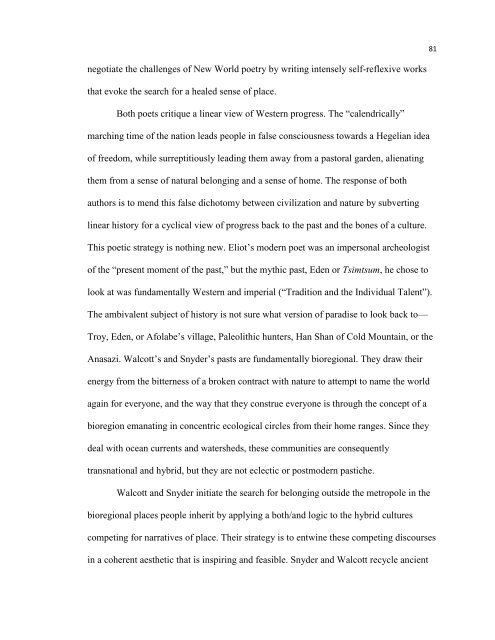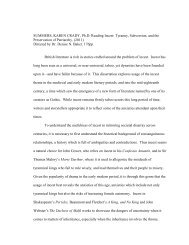RE-INHABITING THE ISLANDS - The University of North Carolina at ...
RE-INHABITING THE ISLANDS - The University of North Carolina at ...
RE-INHABITING THE ISLANDS - The University of North Carolina at ...
You also want an ePaper? Increase the reach of your titles
YUMPU automatically turns print PDFs into web optimized ePapers that Google loves.
81<br />
negoti<strong>at</strong>e the challenges <strong>of</strong> New World poetry by writing intensely self-reflexive works<br />
th<strong>at</strong> evoke the search for a healed sense <strong>of</strong> place.<br />
Both poets critique a linear view <strong>of</strong> Western progress. <strong>The</strong> ―calendrically‖<br />
marching time <strong>of</strong> the n<strong>at</strong>ion leads people in false consciousness towards a Hegelian idea<br />
<strong>of</strong> freedom, while surreptitiously leading them away from a pastoral garden, alien<strong>at</strong>ing<br />
them from a sense <strong>of</strong> n<strong>at</strong>ural belonging and a sense <strong>of</strong> home. <strong>The</strong> response <strong>of</strong> both<br />
authors is to mend this false dichotomy between civiliz<strong>at</strong>ion and n<strong>at</strong>ure by subverting<br />
linear history for a cyclical view <strong>of</strong> progress back to the past and the bones <strong>of</strong> a culture.<br />
This poetic str<strong>at</strong>egy is nothing new. Eliot‘s modern poet was an impersonal archeologist<br />
<strong>of</strong> the ―present moment <strong>of</strong> the past,‖ but the mythic past, Eden or Tsimtsum, he chose to<br />
look <strong>at</strong> was fundamentally Western and imperial (―Tradition and the Individual Talent‖).<br />
<strong>The</strong> ambivalent subject <strong>of</strong> history is not sure wh<strong>at</strong> version <strong>of</strong> paradise to look back to—<br />
Troy, Eden, or Afolabe‘s village, Paleolithic hunters, Han Shan <strong>of</strong> Cold Mountain, or the<br />
Anasazi. Walcott‘s and Snyder‘s pasts are fundamentally bioregional. <strong>The</strong>y draw their<br />
energy from the bitterness <strong>of</strong> a broken contract with n<strong>at</strong>ure to <strong>at</strong>tempt to name the world<br />
again for everyone, and the way th<strong>at</strong> they construe everyone is through the concept <strong>of</strong> a<br />
bioregion eman<strong>at</strong>ing in concentric ecological circles from their home ranges. Since they<br />
deal with ocean currents and w<strong>at</strong>ersheds, these communities are consequently<br />
transn<strong>at</strong>ional and hybrid, but they are not eclectic or postmodern pastiche.<br />
Walcott and Snyder initi<strong>at</strong>e the search for belonging outside the metropole in the<br />
bioregional places people inherit by applying a both/and logic to the hybrid cultures<br />
competing for narr<strong>at</strong>ives <strong>of</strong> place. <strong>The</strong>ir str<strong>at</strong>egy is to entwine these competing discourses<br />
in a coherent aesthetic th<strong>at</strong> is inspiring and feasible. Snyder and Walcott recycle ancient
















